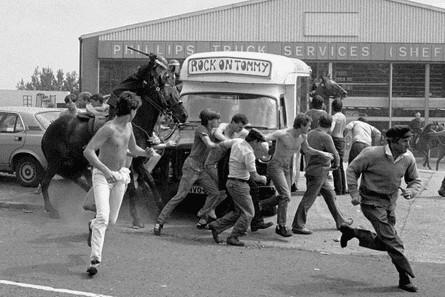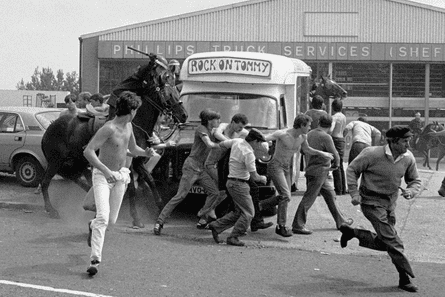
Four Star Review- Strike: An Uncivil War – brutal confrontation on the miners’ strike picket lines
16th Jun, 2024
Four Star Review- Strike: An Uncivil War – brutal confrontation on the miners’ strike picket lines
16th Jun, 2024
The Guardian
Strike: An Uncivil War review – brutal confrontation on the miners’ strike picket lines
Former miners and police officers recall Orgreave, one of the nastiest events in postwar British history, in Daniel Gordon’s forthright documentary
Sun 16 Jun 2024 12.51 BST
British schoolchildren are taught that the last full-scale military engagement on their soil was the battle of Culloden in 1746. But this should change: on 18 June 1984 the battle of Orgreave, the subject of Daniel Gordon’s documentary, was the bitterest moment of the miners’ strike of 1984-85. It was the last stand for both sides, a brutal and chaotic confrontation of about 5,000 pickets determined not to let trucks get through to pick up coke for the Scunthorpe steelworks, versus about 6,000 police officers, some mounted, and armed with new shields and batons.
The police were effectively directed by Downing Street, which was determined that the force should not be overwhelmed by force of numbers as they had been during a comparable situation in the 1972 miners’ strike. A paramilitary strategy developed to suppress colonial disorder was deployed, laid out in a strategy document never shown to parliament.

Miners’ pickets and mounted police at Orgreave on 18 June 1984. Photograph: Martin Jenkinson/Martin Jenkinson Image Library. All rights reserved. DACS/Artimage 2022.
The police excitably drummed on their shields in a bizarre and presumably spontaneous “Zulu Dawn” display of machismo. The officers claimed that their assaults on pickets were in response to attacks – an untruth blandly accepted by the media and political classes but exposed when spurious prosecutions for riot later collapsed in court.
Unlike the Hillsborough case, the policing at Orgreave has never been fully scrutinised. The miners were defeated that day, in the battle that presaged losing the war in general – and as that summer turned to winter, the miners were being starved out. Gordon’s film doesn’t mention it, but in September, Margaret Thatcher’s government rubbed salt in the wound by bailing out Johnson Matthey Bankers in the City, taking on its massive debts.
Gordon speaks to pickets who are still clearly traumatised by the events of Orgreave and by the strike in general. Perhaps therapy has never been on the cards for men of that generation and it could actually be that this film has been the first time that they have ever really spoken or thought deeply about the strike and its long term emotional effects. What emerges is the enduring bitterness that some felt towards those who returned to work; I flinched when one miner tells Gordon that his union-stalwart dad never forgave him for going back. When a reporter at the time asked whether he wouldn’t mind his son going to his funeral, he replies: “I’d rather go to his.”
Police officers recount being instructed by their seniors to fabricate witness statements. BBC reporter Nick Jones is interviewed, rueful about the way things went down. No Tories appear on camera, though, Sir John Redwood, who was director of No 10’s policy unit during the strike, is thanked in the credits.
This is a tough, valuable, forthright film about one of the nastiest, ugliest moments in postwar British history. Since 1985, the debate about fossil fuels has, of course, changed. But it is still staggering that a government planned wholesale mine closures with no thought for and no interest in what would happen to the communities affected.
Strike: An Uncivil War screened at the Sheffield documentary festival on 16 June, and is in UK and Irish cinemas from 21 June.
